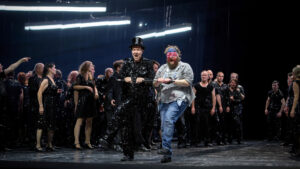Gioconda contains, in its four acts, more plot than three ordinary operas. There are six main characters, each with a solo scene, a leitmotif or two, an attitude, a character arc. Each of them wants something – and the somethings, happily, clash. The opera can be performed with four or five star performers, but to do it with fewer courts disaster.
The last time the Met gave it, it was a vehicle for the ballet dancers, and the ballet only occupies ten minutes in Act III. Most of the other singers were past it or had never approached it. A dreary night. And at the end of Act II, the ship did not blow up. The machinery had decayed too much to join the fun. Applause was tepid—compare the 1968 broadcast currently among the Met’s free offerings up for a vote for re-broadcast. The audience is screaming its collective head off—they don’t want to let the opera go. It’s a first-rate Gioconda—it’s the reason people go to the opera!
When a company is in the pink of operatic life, when there are first-rate singers in every juicy category, one of the best ways to show it off is a fine Gioconda. A great lirico-spinto, capable of exquisite soft singing (“Enzo, adorato!”) and guttural passion (the duet with Laura, and “Suicidio”, plus some bel canto flutters for her suicide) in the title role. A glamorous mezzo is her rival for the tenor—and she gets him, too. An earthy contralto for her mother, La Cieca. You can skimp on La Cieca—her aria comes in Act I, and after that she has very little to do.
The tenor, Enzo, is all mindless testosterone, the sexy dope everyone goes crazy for. (Instead of thoughtful chaps like me.) “Cielo e mar” is one of the great yearning love songs—or lust songs—of opera. He really doesn’t deserve to win the girl he loves and depart with her into the sunset (well, no, Dalmatia is to the southeast of Venice, so it’s not the sunset), but thanks to the noble Gioconda, Enzo and Laura secure just that fate. It’s a lovely trio, the more affecting because we know Gioconda has heroically doomed herself.
Barnaba is the spy of the Inquisition. He knows every secret, and uses it all to serve his own lust. His passion for Gioconda is the engine that drives the plot. His contempt for humanity (“O monumento”) is almost as sweeping as his desire. His motto to everyone is, “Buona fortuna,” Good luck, which is a curse in Italy. But he isn’t quite finished until his last snarl of frustration has filled the theater.
The sextet is completed by his boss, Alvise Badoer, head of the Council of Ten (who command the dictatorial Venetian state), a man whose family pride tops every other concern. His wife loves another man, therefore she must die, her corpse presented to his party guests like a charcuterie plate. He has no ethics—he’s a Badoer. What are ethics?
Gioconda, based on a Victor Hugo farrago that had been used for operas by Mercadante and Cesar Cui, is a frank imitation of Aida. Verdi had more or less retired after that success (he had other tricks up his sleeve, but no one knew it yet), and Italian opera composers were trying to invent a style to replace Verdi’s, works such as Boito’s Mefistofele and Faccio’s Amleto. Verdi was delighted with Ponchielli’s adulation and praised him generously—he wasn’t so wild about the hotshot youngsters. Eventually, with a new generation, Verismo came along.
When the Met had Zinka Milanov and Renata Tebaldi and Eva Marton to sing it, Carlo Bergonzi or Franco Corelli for Enzo, Cornell MacNeil or Leonard Warren as Barnaba, Gioconda defied the naysayers. And nothing gave more pleasure to a house full of opera-goers than Enzo and Gioconda howling curses at each other while the full-rigged ship in the background exploded and the curtain fell on Act II and no one was even dead yet. A Ponchielli afterthought, the splendid concertato that concludes Act III—a quintet because Laura’s lovely corpse doesn’t join in—marks the last time a grand opera reached mid-drama catastrophe in such a manner—Verismo never made use of such devices—and is nonetheless highly satisfying.
For old-fashioned singers’ (and dancers’) opera, nothing beats a great Gioconda. I’m delighted that it’s returning to many houses on the Continent, sad that it arouses little but ignorant scorn in the States.


